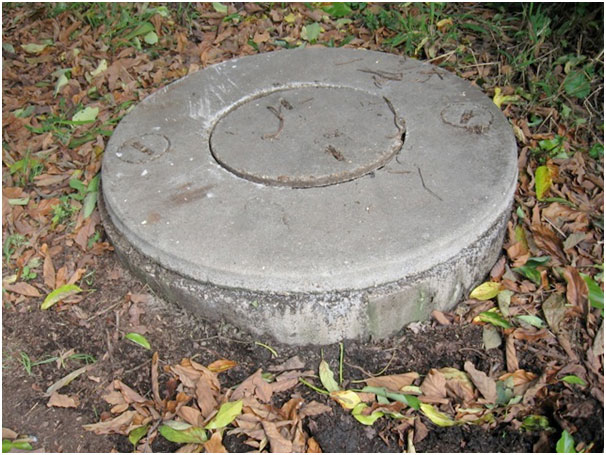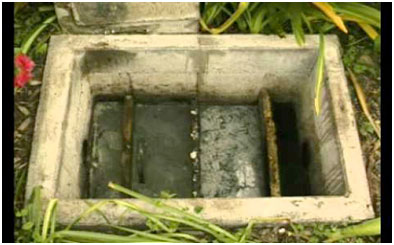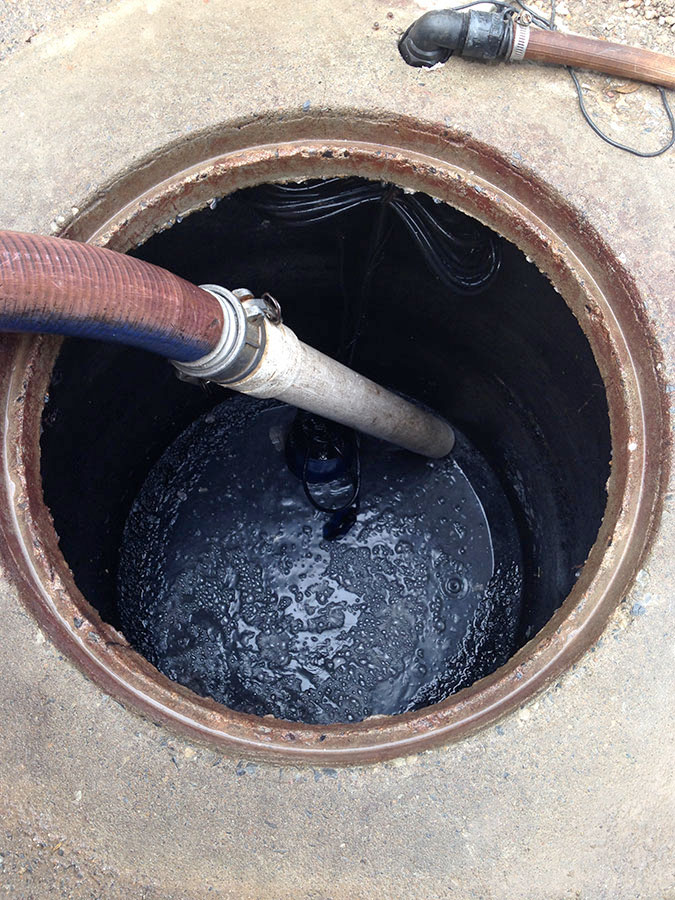In Australia we can experience heavy rainfall causing a multitude of problems but one thing that can be affected is your septic system. There are two main things that can end up happening:
We experience a lot of calls about septic tanks being backed up after there has been heavy rainfall or even during the rainfall itself. A lot of rain can cause the ground to flood quickly around the absorption trenches, which will result in the ground becoming overly saturated.
When the water has nowhere to go, the water is going to eventually end up backing up into the drains and toilets within your home.
You can take some precautions with a few different things that can reduce the risk of this taking place.
All water from downpipes should be directed away from absorption trenches
Always direct your Grey Water (Sullage) wastewater away from absorption trenches.
All natural run off water from rain should be diverted away from absorption trenches.
Keep the grass mowed so the sun can dry out absorption trenches faster.
One of the best things that you can do is make sure that your septic system is in good condition before the rain starts.
Some absorption trenches can work better than others depending on the soil type you have and the size of your absorption trenches.
But making sure your septic system and absorption trenches are in good working order before rainy seasons is the best prevention.
If you think your septic tank system or absorption trenches are faulty the best thing to do is get in touch with a professional company like Wet Waste so that they can inspect your septic system.
With the right maintenance and preventative efforts, you can make a massive difference to your septic system.
We've had a lot of rain here recently, and you may have had problems with gray water. Gray water is water that might have contaminants or chemicals in it.
It may come up from drains (including your showers, bathtubs, sinks, clothes washer or dishwasher drains) aquariums, leaking water beds, and more.
It is important to know how to manage your water usage and what to do with gray water and flooding.
There are many ways to reduce the amount of water you use, such as using it for garden watering ( but never use it for your vegetable plants), toilet flushing, and even installing a rain barrel for collecting the runoff instead of letting it be to the public drainage.
Treated graywater generally carries lower health risks than untreated, its a kind of prevention once heavy rains comes. Moreover, gray water mixed with heavy rainwaters or flooding, in just another 48 hours or so, gray water can devolve into black water – posing serious health risks to you and your family and increasing the damage to your home.
How do you know what type of Septic Tank you have? We will talk about conventional systems with Septic Tanks and Absorption Trenches, Grease Traps and Grey Water (Sullage).
Most older residences have conventional systems compared to newer houses which have HSTPs.
Septic tanks are the larger of the tanks in your yard which can vary in sizes.
These tanks are solely for toilet waste, the solids are caught in the tank and partially digested by bacteria and the reminder settles to the bottom of the tank until it reaches a level where pumping is required.
The excess water from flushing is sent to absorption trenches under the ground which consist of gravel pits where they can dry out through evaporation.Pumping out time of these tanks vary with the size tank and the number of people in the household.

Grease Traps are solely to catch the kitchen grease from your sink or dishwasher and can be found normally outside the kitchen window.
They are normally about 350mm round or rectangular shape with 2 lids that join in the middle about 900mm x 500mm.
These grease traps should be cleaned often at least every 6 months to prevent excess grease build up in the trap and pipes causing blockages also creating bad odours.
The excess water from the grease trap flows into the Grey Water (Sullage)


Grey Water (Sullage) is a tank slightly smaller than your 1600 litre septic measuring about 1000mm across, the waste that comes into this tank is from showers, washing machines, laundry and bathroom sinks.
This waste is considered recycling water for irrigation please refer to our Grey Water page for proper uses.
It is sprinkled out onto grass or ornamental plants for irrigation, all hoses and sprinklers must be purple in colour to identify it is grey water and not fit for Human or Animal consumption.
Different Councils have varying guidelines for wastewater and this is only a guide and may defer from your council. Contact your local council to find out their regulations.
We can inspect and advise you about your tanks get in touch and book it in with us.
Grey water is water from your bathroom sinks, showers, tubs, washing machines and excess water from your Domestic Grease Trap, it is not water with anything related to sewage.
In most cases it is not water that has come into contact with faeces, either from the toilet or from washing nappies. It is wastewater and considered to be a harmlessly recycled water not suitable for drinking.
The color has nothing to do with the quality of the water and it can be used for various purposes such as watering plants, flushing toilets.
Grey water is different from fresh water and requires different guidelines for it to be reused.
Here's the real definition of Grey Water - https://en.wikipedia.org/wiki/Greywater
Sources of greywater include sinks, showers, baths, washing machines or dishwashers.
As greywater contains fewer pathogens than domestic wastewater, it is generally safer to handle and easier to treat and reuse for onsite for toilet flushing and other non-potable uses.
Greywater may still have some pathogen content from laundering soiled clothing or cleaning the anal area in the shower or bath.
Treated greywater has a number of uses, some of which include toilet flushing or irrigation.

Liquid Waste Removal and Septic Tank Cleaning on the Gold Coast, Brisbane, Redlands, Logan and Ipswich Shires.
Call Mark: 1300 552 017
E-mail: [email protected]